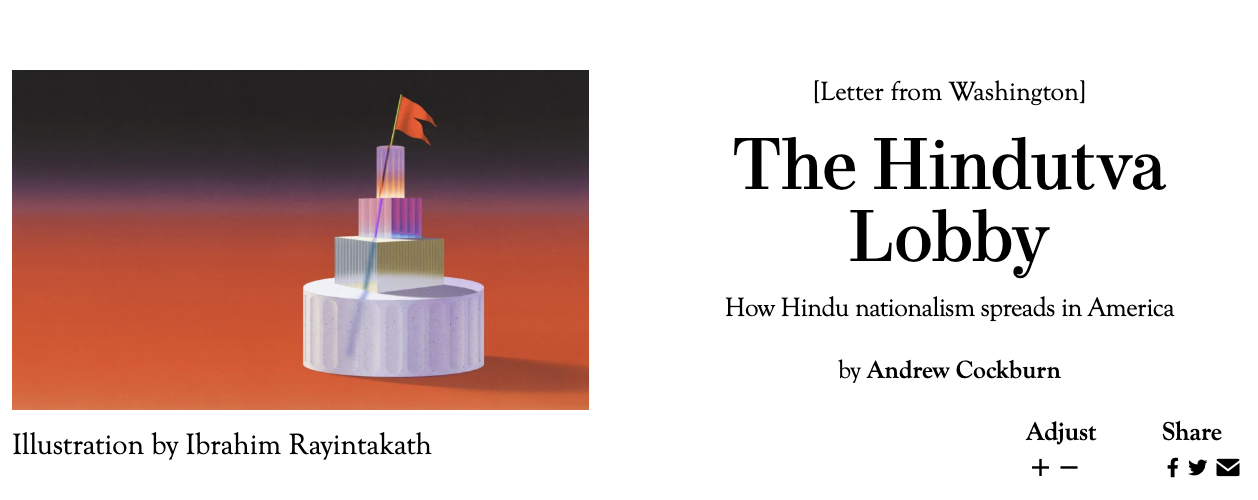
In the summer of 2023, California legislators approved a bill banning discrimination on the grounds of caste. Defined in the bill as “an individual’s perceived position in a system of social stratification on the basis of inherited status,” caste is a central feature of life for hundreds of millions of people in India and beyond. The measure had been championed by California’s Dalit community. Once known as “untouchables,” Dalits occupy the bottommost rung of the Hindu hierarchy, and they have traditionally been confined to menial occupations on the fringes of Indian society, purely by virtue of their birth.
Dalits in California report that this ancient system has been imported to the United States where it remains prevalent in the Indian diaspora, including among those in the tech industry. “They say that in California this doesn’t exist,” declared the measure’s sponsor, State Senator Aisha Wahab. “If it doesn’t exist, then why do we have so many people advocating for the need of this bill?” (As if to corroborate Wahab’s allegations, Google had canceled a planned talk in 2022 by the Dalit activist Thenmozhi Soundararajan, in reaction to the vehement objections posted on internal Google message boards that denounced her as “Hinduphobic”—a common defense against claims of casteism.) Despite furious opposition from leading figures in California’s Hindu tech community—such as Asha Jadeja Motwani, widow of the engineer who helped craft the original Google search algorithm—by September the measure had passed both House and Senate with overwhelming bipartisan majorities and was sent to Governor Gavin Newsom for his signature. While Newsom deliberated, Dalit activists, led by Soundararajan, waged a monthlong hunger strike outside the state legislature. Then, in October, Newsom announced that he was vetoing the bill. It was unnecessary, he claimed, because any discrimination was already covered by existing civil-rights laws.
Newsom’s decision took many by surprise, but others knew better. A month earlier, the ambitious governor, widely considered a future Democratic presidential candidate, flew to Chicago, where Joe Biden’s campaign had convened major donors for a meeting of the Biden Victory Fund PAC. Among them was Ramesh Kapur, a wealthy Massachusetts entrepreneur, whose voice and checkbook carry weight in the firmament of Democratic Party fundraising. In Chicago, Kapur made it clear to Newsom that he faced an important choice: if he ever hoped to secure Kapur’s support, he had better make the right decision on the caste bill. Kapur was hoping to encourage competition between Newsom and Kamala Harris, whose mother was Indian. “I raised money for her when she ran for the Senate and the presidency,” Kapur told me. (His goal, he said, is to elect the first Indian-American president—“hopefully before I get reincarnated!”) “If you want to be our next president,” Kapur bluntly informed the governor, “veto the bill.”
Newsom received an equally unequivocal message from Ajay Jain Bhutoria, another major Biden fundraiser who had served as deputy finance chair of the Democratic Party. “We used very strong words,” Bhutoria, a Silicon Valley entrepreneur, later recounted on Twitter,
telling him that definitely he has a bright future in national politics . . . But at the same time, if there’s a mistake made on his side, he loses the support of the community. And I think he got the message very loud and clear.
The ultimatum was decisive. Kapur said that Newsom emailed him three hours before going public: “I’m going to veto it.” Newsom’s move dashed the hopes of all who had fought for the bill, but it seems likely to reap him rich rewards. “Now that he has made that decision, he has become the champion of the Hindu cause,” Kapur told me over the phone from California, where he was busy organizing the first in a series of fundraisers for the governor in Silicon Valley, Chicago, and New Jersey. “Newsom is hot in the Indian-American community!”
Since July, Indian Americans have found a better champion. Days after Joe Biden dropped out of the presidential race, Kapur himself happily told me that “the whole community is excited, and united” around the news of Kamala Harris’s growing stack of endorsements. As the 2024 election shapes up to be the most expensive ever, with campaigns set to raise and spend at least $15 billion, doors are opening for an emerging lobby of Hindu donors up and down the ballot.
The Indian-American diaspora has been growing ever since passage of the Immigration and Nationality Act of 1965 allowed non-Europeans to settle en masse in the United States for the first time since the Twenties. Given that visa approval was in part skills-based, the influx of immigrants from India was weighted toward the well-educated, who were more likely than not to hail from one of India’s “upper castes.” This trend persisted after 1990, when legislation expanded access to temporary work visas; since then, the Indian-American community has grown to some 4.6 million people, two thirds of whom are Hindu or consider themselves close to Hinduism. The community has flourished economically, notably in the tech industry, where Indian-American CEOs proliferate, including the current bosses of Microsoft, Google, and IBM. A 2019 Pew Research Center study reported that 75 percent of Indian-American adults had a college degree, and that the median annual household income was $119,000. According to a 2020 Carnegie Endowment study, Indian Americans enjoy a standard of living twice that of average Americans. Politicians naturally see potential rich pickings in such a group. Josh Novotney, a Pennsylvania Republican political operative and lobbyist put it to me this way: “It’s extremely important in politics to always build relationships in new communities for both fundraising and for votes, and to also know what’s going on. So if you have the ability to tap into a community like that, it is very valuable.”
This story was originally published in harpers.org. Read the full story here.





